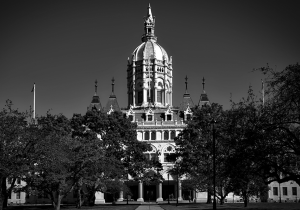The Senate Tuesday night adopted, in concurrence with the House, a $24.2 billion FY23 midterm budget and tax package, which increases spending by $574.4 million, or 6.5 percent, over the current fiscal year. The bill was approved along party lines and now goes to the Governor for his signature.
This election-year budget includes some $600 million in middle class tax relief and extends the $0.25 gas tax cut from June 30, 2022 until December 30, 2022, while investing heavily in human services across all age groups—from infants to seniors.
As detailed in last night’s edition of the Capitol Beat, the adjusted budget plan honors the Constitutional spending and revenue caps, and makes a $3.8 billion contribution to the state’s unfunded pension liability.
On Monday, the Governor’s budget office and the Legislature’s budget experts issued their May consensus revenue estimates. The new estimates peg the FY22 budget surplus at $4.8 billion. When added to the state’s current $3.3 billion Rainy Day Fund, the projected surplus totals an historic $7.9 billion. Given the size of this surplus the state was prohibited from using federal relief funds to replace revenue and therefore allocated these funds—totaling $1.7 billion—to various programs and initiatives. This appropriation of American Rescue Plan Act (ARPA) funding drew criticism from some Republicans who said it amounts to one-time allocations for programs that have ongoing needs. Republicans also lamented that the tax cuts were not broader in scope.
Below is a summary of some of the spending and revenue proposals contained in the adjusted budget.
SPENDING
On the spending side, the agreement invests heavily in social services, including support for nonprofit human service providers, children’s mental and behavioral health services, and child care providers. Following are some of the investments included in the bill:
- COLA increases of 8% for nonprofit community service providers.
- Support for workforce development training.
- Funding to support raises for state employees, state legislators and state Constitutional officers.
- Increasing support for Unemployment Insurance Trust Fund by $40 million.
- New incentives, including $10 million in vouchers, for medium and heavy-duty electric vehicles and buses and installation of charging infrastructure.
- New grants to assist families in covering the cost of mental health services and treatment for their children from pre-school to 12th grade.
- New psychiatric treatment beds and funding for 24/7 mobile psychiatric treatment.
- Support to increase family child care home staffing and Birth-to-Three providers.
- Additional investment totaling $50 million in affordable housing.
- Accelerated phase-in of Education Cost Sharing weights for charter schools and increase in charter school seats.
- Reduced co-pay for State-funded Home Care Program to 3%.
- Support for state-employee union raises in FY23 totaling $444 million.
REVENUE
The revenue side of the midterm budget calls for:
- Extending the $0.25 gas tax reduction from June 30 to December 31, 2022.
- Increasing property tax credit from $200 to $300.
- Creating $250 per child tax credit, up to three children, for qualifying families.
- Lowering the statewide cap on the car tax from 45 mills to 32.46 mills.
- Boosting the state’s Earned Income Tax Credit for 2022 tax year to 41.5%, providing $42 million in relief.
- Accelerating the income tax exemption schedule for pension and annuity earnings for qualifying middle-income residents ($75,000 single filers, $100,000 joint filers).
- Expanding the tax credit program for businesses that make eligible education loan payments on a qualified employee’s behalf.
- Expanding the exemption from the motor fuels tax to EMS systems.
Finally, with just over 24 hours left in the session, most of the activity in the House and Senate involves housekeeping. The regular session adjourns at midnight Wednesday.


